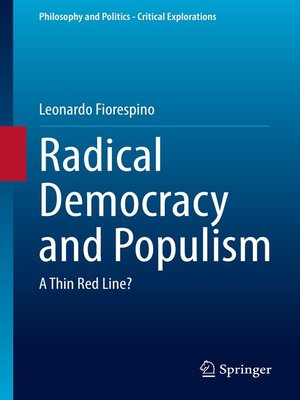Radical Democracy and Populism
ebook ∣ A Thin Red Line? · Philosophy and Politics--Critical Explorations
By Leonardo Fiorespino

Sign up to save your library
With an OverDrive account, you can save your favorite libraries for at-a-glance information about availability. Find out more about OverDrive accounts.
Find this title in Libby, the library reading app by OverDrive.



Search for a digital library with this title
Title found at these libraries:
| Library Name | Distance |
|---|---|
| Loading... |
This book offers an extensive comparative analysis of populism and radical democratic theories, tracing the line dividing the respective conceptions of 'people' and 'popular sovereignty'.
Whereas populism is often said to intertwine with democracy in some way, the contention of this book is that it significantly departs from democratic theory and practice, and belongs to a distinct conceptual space. It cannot be made to overlap, for instance, with "illiberal democracy", the "democratic myth", a crude electoral majoritarianism, nor can it amount to hiding undemocratic policies into properly democratic justifications. These positions, frequent as they are in the literature, are contested on the grounds of the dividing line identified, which starts unfolding at the level of the conception of 'the people' – i.e., of the sovereign – presupposed by populists and democrats.
This book is of great interest to scholars involved in the study of democratic theory, contemporary challenges to democracy and the recent upsurge of populist discourse, as it helps better understand populism as a political phenomenon and more adequately defines it as a self-standing concept in political theory.
Whereas populism is often said to intertwine with democracy in some way, the contention of this book is that it significantly departs from democratic theory and practice, and belongs to a distinct conceptual space. It cannot be made to overlap, for instance, with "illiberal democracy", the "democratic myth", a crude electoral majoritarianism, nor can it amount to hiding undemocratic policies into properly democratic justifications. These positions, frequent as they are in the literature, are contested on the grounds of the dividing line identified, which starts unfolding at the level of the conception of 'the people' – i.e., of the sovereign – presupposed by populists and democrats.
This book is of great interest to scholars involved in the study of democratic theory, contemporary challenges to democracy and the recent upsurge of populist discourse, as it helps better understand populism as a political phenomenon and more adequately defines it as a self-standing concept in political theory.







